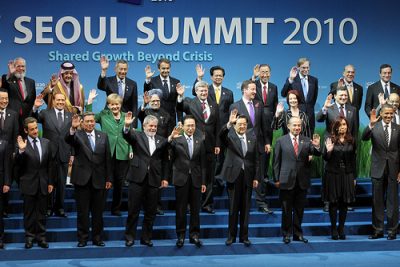The short of it is that the G20 is still on track with its task of managing global recovery and positioning for the long term as the premier institution in global economic governance. As Dobson suggests, the pressures of domestic politics may have weakened the sense of urgency as the crisis fades. ‘The group’s diversity is showing,’ she says. ‘And domestic issues are beginning to crowd leaders’ priorities. As well, it seems that each new host feels compelled to lengthen the agenda, with the Koreans adding development and the French host in 2011 mooting its perennial summit favourite, reforming the international monetary system.’ But there is a clearer consensus emerging among leaders about the key instruments that now need to be deployed in moving to sustainable growth beyond the crisis. And we saw emerge at Seoul, mobilisation of will and an effort to insure against the second round effects of the crisis in the form of incipient trade protectionism as industrial economies strive to manage the difficult politics of continuing unemployment and debt levels as they inch towards recovery. As Australian Prime Minister Gillard urged at the summit, next year presents a critical opportunity to close on the Doha Round of WTO negotiations and keep protectionism at bay.
Whatever its fragility and the challenges to its legitimacy, the elevation of the G20 to its primary role in global economic governance is a considerable achievement. It would not have been possible without the farsightedness of the US Administrations — both the Bush Administration that saw its value in dealing with the immediate fallout from the crisis and the Obama Administration that saw in it the opportunity for fundamental transformation of the regime of global economic governance. It would not have succeeded as it has so far without, what Dobson calls, the ‘laser-like’ focus the crisis induced in world leaders to make the collective international interest triumph in sufficient measure over narrow national interests.
There are both matters of substance and matters of process that now have to be confronted if the success thus far is to continue.
On substance, sustainable recovery and growth will require rebalancing the global economy, and the whole gamut of things that implies for shifting around policies in both the developed and the developed world. The proximate tensions are around how, and whether, the exchange rate is deployed in China to ease its current account surplus and domestic inflationary pressures and what the monetary expansion in the US does to weaken the dollar at the same time as provide a kick to recovery. But the heavy lifting, on both sides, will be in dealing with the deep structural problems in emerging economies and the developed world alike that are at the root of the imbalances that could threaten steady recovery and continuing growth.
On the process, continuing to strengthen and reform the considerable institutional infrastructure with which the G20 is endowed (in the form of the established relations among member finance and monetary authorities and the underpinning it has of the international financial institutions) is one element. Another, as Dobson implies, is maintaining priority and focus. This will be even more important as the crisis fades. It is already important as the diversity of membership encourages an agenda that pretends to offer something for everyone. A related element is respect for the nature of the process, a process that brings no supra-national authority to outcomes except the willingness and commitment of participants to bring their national contributions to the public good to the table. And there is the question of building the G20’s reach out to, and inclusion of, economies that don’t sit at the table.

